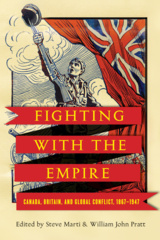
For Home and Empire
Voluntary Mobilization in Australia, Canada, and New Zealand during the First World War
For Home and Empire is the first book to compare voluntary wartime mobilization across the Australian, Canadian, and New Zealand home fronts. It draws together case studies from the dominion home fronts to build a history of nations and empire in wartime.
In the First World War, dominion governments relied heavily on voluntary efforts to support the expansion of their skeletal peacetime armies into formidable expeditionary forces. Communities organized to raise recruits, donate funds, and provide supplies ranging from a pair of socks to an airplane. Their efforts strengthened communal bonds, but they also reinforced class, race, and gender boundaries. Which jurisdiction should provide for a soldier’s wife if she moved from Hobart to northern Tasmania? Should Welsh women in Vancouver purchase comforts for local soldiers or for Welsh soldiers in the British Army? Should Māori volunteers enlist with their home regiment or with a separate battalion? Voluntary efforts reflected how community members understood their relationship to one another, to their dominion, and to the Empire.
Steve Marti examines the motives and actions of those involved in the voluntary war effort, applying the framework of settler colonialism to reveal the geographical and social divides that separated communities as they organized for war.
This book will appeal not only to historians of the First World War and the British Empire but also to those with an interest in settler colonialism, voluntary action, and war and society in Australia, Canada, and New Zealand.
Steve Marti’s lively and informative monograph For Home and Empire: Voluntary Mobilization in Australia, Canada, and New Zealand during the First World War will be a worthwhile addition to the reading list of anyone interested in understanding the impact of the Great War on the British Empire.
Marti weaves together multiple strands of historiography to present fresh insights into the wartime societies of Australia, New Zealand and Canada...[his] level of detail and meticulously supported arguments offer little room for critique.
Marti’s research is impressive and suggestive, and the comparative approach will add substantially to further efforts to understand the Great War in the British Dominions.
An impressive and invaluable work of transnational history.
For Home and Empire provides significant new vantage points on wartime mobilization and the influence of the local on the national and imperial contexts. Its illumination of the importance of local organizing opens up new areas of inquiry.
Introduction
1 Dominion over War: Local Volunteers, Dominion Mobilization, and the Imperial War Effort
2 Hands across the Sea: Greater Britain, New France, and the Ties to Home and Homeland
3 Far from Home: Race and the Boundaries of Communal Mobilization
4 Aliens or Allies: Southern and Eastern European Immigrants and the Bonds of Military Service
5 As Obsolete as the Buffalo and the Tomahawk: Assimilation, Autonomy, and the Mobilization of Indigenous Communities
Conclusion
Notes; Bibliography; Index












